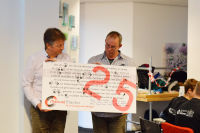‘A good auditor is stupid, lazy and homeless’
The more than 30 auditors who participated in our MasterClass Internal Audits were on their toes again. Quality experts Anita te Riet and Sascha van de Ven bombarded them with new insights, guidelines, resources and tips during our latest online MasterClass; ‘useful tools to improve quality in their organizations’.
Anita and Sascha are both part of QAducation, which has been developing and providing quality assurance courses for 23 years. Sascha defines the purpose of an audit succinctly: ‘An audit is nothing more and nothing less than wanting to improve an organization.’ Anita adds: ‘Awareness of that fact is often lacking.’ During the MasterClass of our ManualMaster Academy, the work of auditors was critically examined. In small groups, the students reflected on questions such as: who do we actually audit for and why do we conduct audits. In this way, the students were taken through the audit process and matters such as the PDCA cycle.
Pretend you don’t know anything
“In practice, we come across many nice audit plans on paper, which are, however, not implemented in the organization,” says Sascha. ‘What requirements do a good auditor and audit meet?’ The students also looked for an answer to this question together. ‘A good auditor is stupid, lazy and homeless,’ suggested participant Cees Broeren, to the amusement of other students. ‘Stupid, because as an auditor you act as if you know nothing. Lazy because you let others talk and fill things in for you and homeless because you talk to everyone and don’t really belong anywhere.’
The auditor’s hard and soft skills
In the audit world, it is all about knowledge of standards, professional and basic knowledge of the subject matter, experience and not being afraid to ask the right questions.
Good training and extensive knowledge of the subject matter are indispensable as hard skills for a good auditor. But it became clear that you also need to have the necessary soft skills. An auditor must be confident, dare to ask pointed questions, strive for acceptance within the organization, have strong communication skills and be able to judge objectively.
Anita: ‘It takes at least three years before you can carry out a good audit. We can all get a driver’s license, but you only learn to drive by doing it.’
A good audit plan requires good preparation
The auditors were provided with tips to make an audit a success. Anita: ‘A good audit plan depends on good preparation. That takes most of the time. Also note that the process is audited and not the person. An audit should not be experienced as a personal approach. That is often a pitfall.’ The audit tips were discussed in detail and substantiated by Sascha and Anita. They also discussed issues that the participants of the MasterClass encounter during their daily work and questions they could raise themselves. What to put in your audit report and what not? How extensive should an audit be?
The latter was answered by Anita with: ‘That depends on how well an organization is put together and how complaints and incidents are registered.’
Audit forms to support the audit process
In the lively discussions and conversations that arose, the students shared their own ideas and experiences. Auditor Peter Louisse pointed out how the audit forms that he compiles with Trevally are very useful to him in his work. ‘They support me in following up on the advice I give.’
Click here to read more about Audit Management with Trevally.







